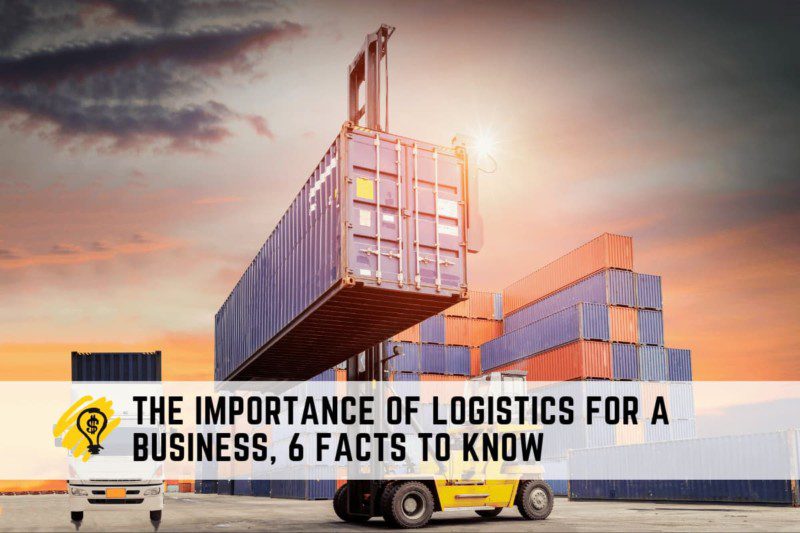Logistics is the backbone of any successful business. It involves a variety of activities, such as inventory management, transportation, and warehousing. Logistics plays an important role in ensuring that goods are delivered on time to customers and that they meet their needs. Without efficient logistics processes, businesses can suffer from decreased customer satisfaction and lower profits.
Here are six facts about the importance of logistics for a business – including improving customer service levels, reducing costs associated with transportation and storage expenses, and creating competitive advantages over other companies in the industry.
1. An Essential Part of Customer Service
An efficient logistics system allows businesses to quickly and accurately deliver goods to their customers. This helps to build trust and loyalty with customers, as they know that their orders will be delivered on time. Furthermore, it allows businesses to provide better customer service by being able to track and trace orders. You can also find out more about how logistics disrupt the industry and how companies use it to their benefit. While some companies use third-party logistics service providers, others create their system of distribution. Make sure to know the pros and cons of either option for your business.
2. Reduces Transportation Costs and Storage Expenses
By streamlining the process of transporting goods to customers, businesses can save money on fuel costs, shipping fees, and other expenses associated with transportation. Furthermore, an efficient warehousing system can help reduce inventory carrying costs and storage expenses as well. For example, warehouse automation systems allow companies to optimize their storage space and increase the efficiency of operations.
Additionally, automated warehouse systems can help reduce the amount of time required for inventory management activities such as picking, packing, receiving, and replenishment. Streamlining these tasks through automation ensures businesses can reduce labor costs associated with manual processes.
3. Increases Efficiency and Productivity
Efficient logistics systems can help ensure that goods are delivered faster, reducing the amount of time between order placement and delivery. Additionally, they can help optimize warehouse operations by utilizing technologies such as radio frequency identification (RFID) tracking systems or automated guided vehicles (AGVs). This helps to reduce manual labor costs while ensuring accuracy in inventory management activities. When combined with effective use of resources, such as just-in-time (JIT) inventory management and route optimization software, logistics systems can help businesses achieve maximum efficiency.

4. Promotes Business Growth
Logistics plays an important role in scaling your business by helping companies keep up with customer demands. By having efficient processes, businesses can maintain a competitive edge over other companies in their industry. For example, if a company can deliver orders faster than its competitors, it may be able to gain more customers. Additionally, businesses can use logistics to expand their market by providing delivery services in new locations that they previously did not serve. While providing these services may require additional resources, the rewards could be great if done properly. And, by providing customers with faster delivery and more reliable service, businesses can differentiate themselves from their competitors.
5. Generates Revenue
By having efficient processes in place, businesses can quickly and accurately deliver orders to their customers, resulting in increased sales and customer satisfaction. This helps to drive higher profits for the business through increased customer loyalty and repeat purchases. Furthermore, businesses can also leverage logistics as a competitive advantage over other companies in the industry by offering faster delivery times or lower shipping costs than their competitors.
For most businesses, this can result in a significant increase in sales and profits. And, of course, make sure to consider the cost of logistics compared to its long-term benefits. Most businesses fear implementing logistics due to the cost. However, the return on investment is greater than you can imagine.
6. Improves Business Agility
Being more agile when responding to changing customer demands and market conditions is crucial for efficient business operations. For example, businesses can quickly adjust their supply chain management processes to meet customer demands promptly. Furthermore, efficient logistics systems enable companies to quickly adapt to market changes without suffering from significant delays or losses.
Business agility also depends on the ability of the company to quickly adjust its strategies and operations based on current market trends. By having a well-organized logistics system, businesses can respond faster and more effectively to changing market conditions.
Implementing an efficient logistics system can help businesses reduce costs, increase efficiency and productivity, promote growth, generate revenue, and improve business agility. By leveraging logistics to optimize their operations, businesses can gain a competitive edge over their competitors and become more profitable in the long run. Ultimately, having an effective logistics system is essential for any business that wants to succeed in the modern marketplace.



